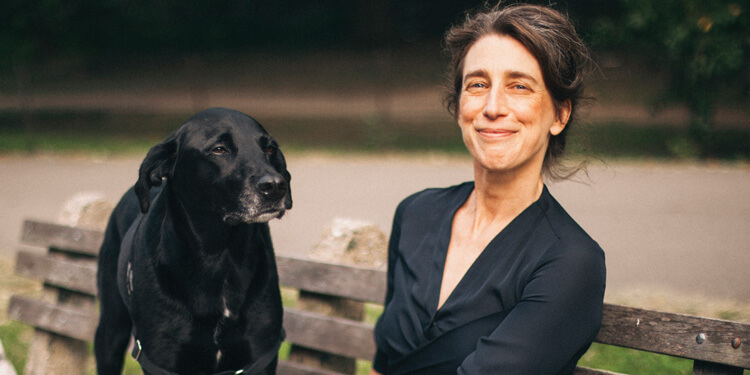Alexandra Horowitz ’87 studies dogs for a living. Sound fun?
While the Colorado Academy alumna’s career is one that a lot of people might enjoy, it is also one that didn’t exist 20 years ago. When she established the Horowitz Dog Cognition Lab at Barnard College in 2008, it was the first of its kind in the United States. Now, dog cognition is a vibrant research field.
“I was equipped by my parents and by Colorado Academy with the sense that if you pursue the thing you love, then it can become your career,” Horowitz says. “It was as simple as that.”
A Barnard College faculty member, Horowitz does research and teaches courses in canine cognition and creative nonfiction. She has written four books in the last 10 years, including the #1 New York Times best-seller Inside of a Dog: What Dogs See, Smell, and Know.
Through the eyes (and nose) of a dog
Like many people, Horowitz loves dogs—but she wants to do more than love them. She wants to know them, to understand them, to answer the question: what it is like to be a dog?
She spends hours watching canine pets interact with one another and with different environments. She examines how dogs see and make sense of the world, whether they have a sense of fairness, and what it really means when they give the “guilty look” many dog owners know.
She’s learned much about the importance of dogs’ sense of smell, and what it means to be a primarily olfactory creature. Dogs navigate by smell, recognize people and other dogs by smell, and tell time by smell. She delves into this topic in Being A Dog: Following the Dog into a World of Smell.
“I had an ordinary, uncomplicated understanding of dogs—that they’re friendly, loyal, responsive animals,” she says. “But as soon as you look deeper, you see both the depths and the limitations of their abilities.”
Horowitz believes there is value in increasing our knowledge of dogs and other domesticated animals.
“With this knowledge, we can figure out how to better treat and live with them,” she says. “We owe a lot to dogs, as a species, because we’ve domesticated them and changed them to be dependent on us. There are a lot of ways we can enrich their lives.”
A career made from scratch
Born in Philadelphia, Horowitz moved with her family to Golden, Colo., as a child. She attended CA from Second Grade through graduation from the Upper School. She always remembers loving dogs, but veterinary work—the common option—didn’t interest her, so she never envisioned herself working with dogs.
Even as a graduate student, it didn’t occur to her that she would run a dog cognition lab—because there were no such labs. And when she finally started studying dogs, she encountered some resistance in academia.
“I had to convince people that it was an interesting and terrific subject,” she says. “And I convinced them.”
She achieved that through the power of her own conviction and confidence—which she says came from her upbringing and her CA education.
“I was very influenced by the idea that there’s not just one way or one right answer and that it’s worth engaging as fully as you can in your own interests,” she says. “At CA, if you could find an interesting way to accomplish something, teachers were willing to accept that.”
Helping students feel like rock stars
Horowitz now lives far from the Rocky Mountains of her childhood, in New York City with her husband, son, two “highly sniffy” dogs, and one cat. She enjoys not only her research, but her teaching, which has also been impacted by her experiences at CA.
She remembers the respect that CA teachers had for students, and she strives to pay it forward to her own students.
“What I most appreciate is having had teachers who took you seriously at CA, even as a young student with sometimes immature thinking,” she says. “It’s a great credit to teachers who can do it, because it’s empowering to students. It just made you feel like a rock star.”
Horowitz tries to empower her own students in a similar way, encouraging them to follow the path that’s right for them, even if it’s not linear.
“I’m a professor, a researcher, and a writer, and I’ll probably be something else in 10 years,” she says. “I didn’t have a grand career plan. Many things just unfolded as I went, and that’s perfectly okay. Look for the thing you love to do or feel skilled at, and pursue it as much as you can, and a career will unfold. That’s the fun of it.”
